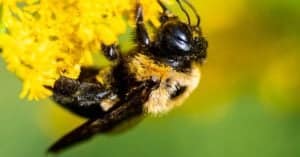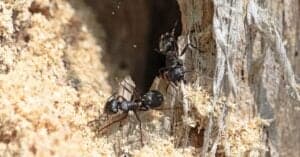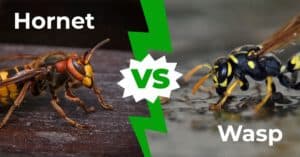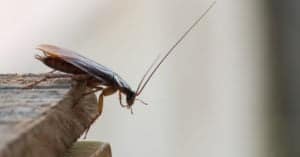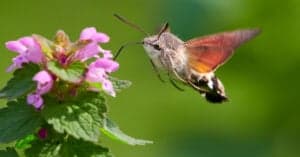What Do Earthworms Eat? Their Diet Explained
Earthworms are common terrestrial invertebrates of the order Annelida, known as ringed or segmented worms. They are decomposers and detritivores, or detritivoral decomposers, and are important for the natural balance of the ecosystem. The earthworm’s role is the elimination of decaying or dead organic matter to allow for the new growth of plants. They are also important in the food chain as they provide excellent protein for their predators and enrich the soil with their mucus and excretions. But what do these slimy worms eat as they burrow in soil all day? Let’s explore the earthworm diet together.
What Do Earthworms Eat?
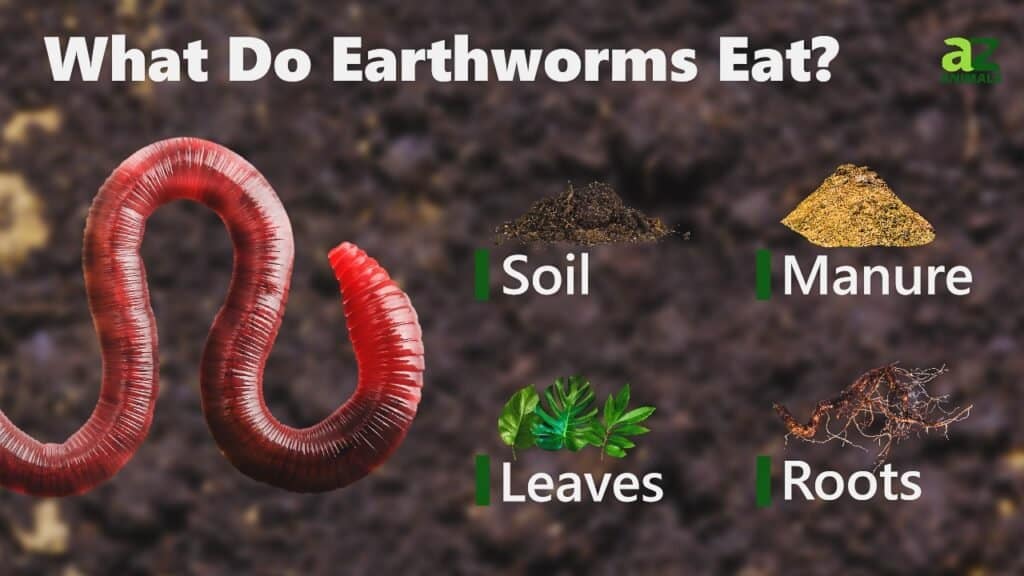
A-Z-Animals.com
Earthworms are decomposers, meaning they break down organic matter into basic nutrients for the soil. They are also detritivores, meaning they eat dead organic matter, including feces. You’d be surprised to learn, then, that earthworms eat dirt. Within the dirt is organic matter, including plant matter and dead animals as well as algae, fungi, bacteria, protozoa, nematodes, rotifers, and other microorganisms.
The diet of wild earthworms is different from the diet of earthworms in captivity. Wild earthworms are at risk of ingesting pesticides and other harmful substances which also get ingested by their predators. Earthworms in captivity are often fed food scraps, which turn into compost as they’re excreted.
How do earthworms find food?
Earthworms aren’t so much concerned about finding food as they are being able to breathe and stay moist in the soil. Most earthworm species prefer neutral to slightly acidic soil. The nightcrawler (Lumbricus terrestris) has a pH of 5.4, Dendrobaena octaedra has a pH of 4.3 and certain Megascolecidae are in very acidic, humid soil. More acidic soil makes worms go into diapause sooner and remain in it longer at a pH of 6.4.
Once they can find comfortable soil conditions, earthworms start searching for food sources. They have a sort of mental GPS that comes into play when there’s no chemical scent of food. Although they have small nervous systems, they can search in a specific area or a more widespread one. If they don’t find food in their immediate area after several minutes, they will turn less and explore a larger area.
How do earthworms eat?
An earthworm’s digestive system is interesting and strange. Although it’s an invertebrate, it shares a couple of organs in common with birds, gastropods, archosaurs, and some fish and crustaceans – the crop and the gizzard. The crop is used to store food and the gizzard is a specialized stomach that grinds up food with the aid of grit or stone.
That’s where the similarities end, however. The earthworm’s digestive system has a mouth, buccal cavity, esophagus, crop, gizzard, intestine, and anus. It forms a straight long tube from the mouth to the anus. Earthworms have no teeth, so they swallow their food whole. They use a lips-like flap to push the food in, after which their throat muscle takes hold to lubricate it with saliva and push it down the esophagus.
Because of their diet including microorganisms, earthworms have several internal parasites, and not just in their digestive system. These include protozoa, nematodes, and Platyhelminthes. They can be in their blood, intestine, coelom, seminal vesicles, or in their cocoons.
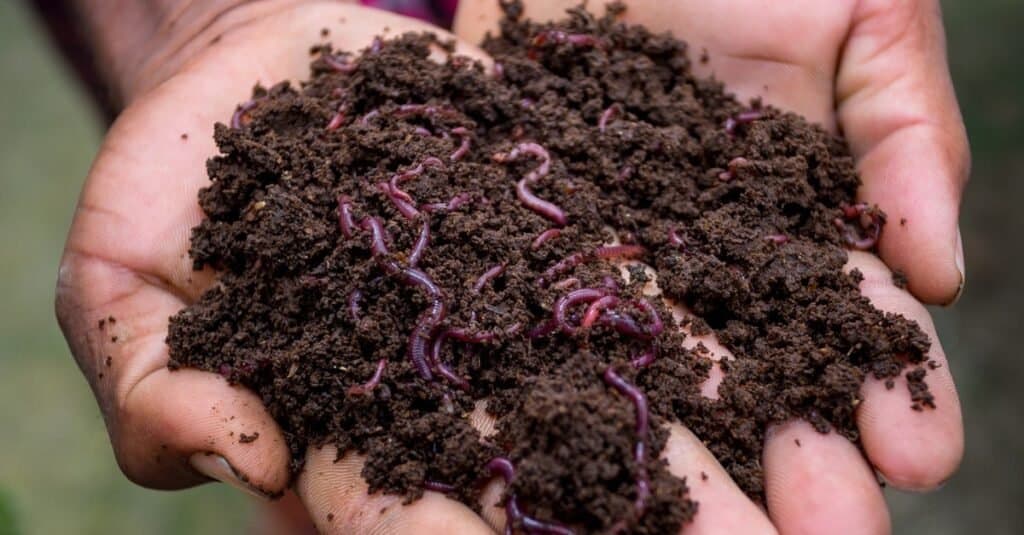
Jahangir Alam Onuchcha/Shutterstock.com
A Complete List of Foods Earthworms Eat
There are three categories of earthworms:
- Leaf-litter or compost-dwelling (epigeic) are nonburrowing and eat decaying organic matter on the surface, such as Eisenia fetida (red worm)
- Topsoil- or subsoil-dwelling (endogeic) burrow in and eat the soil
- Permanent burrow-dwelling (anecic) visit the surface for plant matter, such as Lumbricus terrestri (nightcrawler)
What wild earthworms eat:
- Microorganisms
- Fruits and vegetables
- Leaves, grass, and other plant matter
- Fungi
- Algae
- Dead animals
What earthworms in captivity (compost worms) eat:
- Fruit and vegetable scraps
- Eggshells
- Grains (in moderation)
- Dry garden leaves
- Tea bags and coffee grounds
- Moldy bread
- Hair and nail clippings
- Shredded newspaper (black ink only) and cardboard
- Cotton rags
- Cow and horse manure
Next Up: 6 Birds That Look Like Ducks
FAQs (Frequently Asked Questions)
Do earthworms eat grass and leaves?
Yes. They will eat grass and leaves whether it is living, decaying, or dead, and turn them into compost.
What do earthworms eat in the soil?
Living, dead, or decaying organic matter, including plants and animals.
What do you feed earthworms to keep them alive?
Earthworms in captivity, also called compost worms, eat kitchen fruit and vegetable scraps.
What are three things a worm does not eat?
Spices, salty foods, and citrus, pineapple, and other acidic foods. Plastic, color ink, poisonous plants, sawdust, and pesticide-treated grass are toxic to worms. Oils, dairy, and meat will go rancid and attract animals.
More from A-Z Animals
Earthworms are common terrestrial invertebrates of the order Annelida, known as ringed or segmented worms. They are decomposers and detritivores, or detritivoral decomposers, and are important for the natural balance of the ecosystem. The earthworm’s role is the elimination of decaying or dead organic matter to allow for the new growth of plants. They are also important in the food chain as they provide excellent protein for their predators and enrich the soil with their mucus and excretions. But what do these slimy worms eat as they burrow in soil all day? Let’s explore the earthworm diet together.
What Do Earthworms Eat?

A-Z-Animals.com
Earthworms are decomposers, meaning they break down organic matter into basic nutrients for the soil. They are also detritivores, meaning they eat dead organic matter, including feces. You’d be surprised to learn, then, that earthworms eat dirt. Within the dirt is organic matter, including plant matter and dead animals as well as algae, fungi, bacteria, protozoa, nematodes, rotifers, and other microorganisms.
The diet of wild earthworms is different from the diet of earthworms in captivity. Wild earthworms are at risk of ingesting pesticides and other harmful substances which also get ingested by their predators. Earthworms in captivity are often fed food scraps, which turn into compost as they’re excreted.
How do earthworms find food?
Earthworms aren’t so much concerned about finding food as they are being able to breathe and stay moist in the soil. Most earthworm species prefer neutral to slightly acidic soil. The nightcrawler (Lumbricus terrestris) has a pH of 5.4, Dendrobaena octaedra has a pH of 4.3 and certain Megascolecidae are in very acidic, humid soil. More acidic soil makes worms go into diapause sooner and remain in it longer at a pH of 6.4.
Once they can find comfortable soil conditions, earthworms start searching for food sources. They have a sort of mental GPS that comes into play when there’s no chemical scent of food. Although they have small nervous systems, they can search in a specific area or a more widespread one. If they don’t find food in their immediate area after several minutes, they will turn less and explore a larger area.
How do earthworms eat?
An earthworm’s digestive system is interesting and strange. Although it’s an invertebrate, it shares a couple of organs in common with birds, gastropods, archosaurs, and some fish and crustaceans – the crop and the gizzard. The crop is used to store food and the gizzard is a specialized stomach that grinds up food with the aid of grit or stone.
That’s where the similarities end, however. The earthworm’s digestive system has a mouth, buccal cavity, esophagus, crop, gizzard, intestine, and anus. It forms a straight long tube from the mouth to the anus. Earthworms have no teeth, so they swallow their food whole. They use a lips-like flap to push the food in, after which their throat muscle takes hold to lubricate it with saliva and push it down the esophagus.
Because of their diet including microorganisms, earthworms have several internal parasites, and not just in their digestive system. These include protozoa, nematodes, and Platyhelminthes. They can be in their blood, intestine, coelom, seminal vesicles, or in their cocoons.

Jahangir Alam Onuchcha/Shutterstock.com
A Complete List of Foods Earthworms Eat
There are three categories of earthworms:
- Leaf-litter or compost-dwelling (epigeic) are nonburrowing and eat decaying organic matter on the surface, such as Eisenia fetida (red worm)
- Topsoil- or subsoil-dwelling (endogeic) burrow in and eat the soil
- Permanent burrow-dwelling (anecic) visit the surface for plant matter, such as Lumbricus terrestri (nightcrawler)
What wild earthworms eat:
- Microorganisms
- Fruits and vegetables
- Leaves, grass, and other plant matter
- Fungi
- Algae
- Dead animals
What earthworms in captivity (compost worms) eat:
- Fruit and vegetable scraps
- Eggshells
- Grains (in moderation)
- Dry garden leaves
- Tea bags and coffee grounds
- Moldy bread
- Hair and nail clippings
- Shredded newspaper (black ink only) and cardboard
- Cotton rags
- Cow and horse manure
Next Up: 6 Birds That Look Like Ducks

